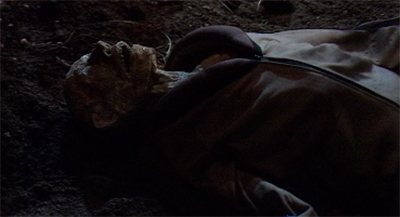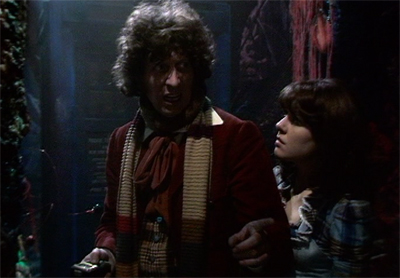To celebrate the fiftieth anniversary of the longest-running science-fiction show in the world, I’ll be taking weekly looks at some of my own personal favourite stories and arcs, from the old and new series, with a view to encapsulating the sublime, the clever and the fiendishly odd of the BBC’s Doctor Who.
Planet of Evil originally aired in 1975.
He used the neutron accelerator. If he hit Sorenson, it could be disastrous.
You mean things can get worse? I don’t believe it.
– the Doctor and Sarah Jane make sure we understand the stakes
I feel a bit sorry for Planet of Evil. I mean, it sits near the start of one of the best seasons of Doctor Who, and yet it’s generally overlooked. It’s not that Planet of Evil is bad – The Android Invasion from the same season is actually bad, and is remembered as such. It’s more that Planet of Evil doesn’t really feel as exceptional as it could be. The Hinchcliffe and Holmes era of Doctor Who was cranking out classic adventures and iconic images to beat the band, but Planet of Evil just wound up feeling relatively generic. That’s not necessarily entirely fair. The opening two episodes of Planet of Evil are superb, but it is let down by a fairly average conclusion and undermined by a fairly weak supporting cast.
It is nowhere near the best story of the season, but it’s hardly a spectacular failure. there are times in the history of Doctor Who where Planet of Evil would be a welcome relief. However, it suffers from being a reasonably mediocre adventure in a fantastic season.
It’s worth pausing to remark that it is a great title, that. It’s overblown, melodramatic and sensationalist, but it’s one of those titles that evokes Doctor Who. It’s pure and unadulterated pulp – a title like The Deadly Assassin. It’s the kind of title that evokes overgrown alien jungles and soon-to-be-slaughtered space marines and the sort of trippy imagery of Tom Baker tumbling into distorted darkness, being almost attacked by the camera.
And, to be fair, there’s a lot that Planet of Evil does right. I love the first two episodes. The jungle sets are downright amazing, some of the best studio work the show has ever done – there’s a very clear sense that Zeta Minor is quite unlike any other planet we have ever visited. It’s not quite like something out of Hammer Horror, like in The Brain of Morbius. Instead, it’s very clearly a science-fiction locale, albeit one tainted and infected by the horror genre. It’s like the twisted cousin of Spiridon from Planet of the Daleks. Which feels appropriate, since both stories are “Planet of…” adventures directed by David Maloney.
Maloney is a wonderful director, and he does some absolutely fantastic work on the first two episodes. The shots of people wandering (and running) through the jungles of Zeta Minor are surprisingly creepy. We don’t see any life on the planet except for the expedition and the anti-matter monster, but there’s very clearly a sense that the cast should be watching where they are going. It’s not too difficult to imagine somebody taking the wrong turn and getting stuck in the jungle forever.
However, there’s another side to that coin. The final two episodes take place on what might be the most generic space craft we’ve yet seen on Doctor Who. It’s all well-lit white corridors and large rooms. Maloney does what he can with the sets and the material, but it all suddenly feels a bit less pulpy and exciting. Suddenly, the story is a lot more sterile. Even by virtue of being on a ship in somewhat familiar surroundings, the stakes seem tangibly lower.
It doesn’t help that the serial has a fairly weak supporting cast, and that the weaker members steal the focus of the story once we board the ship. Prentis Hancock is genuinely terrible as the young commander of the mission, Salamar. There are several moments that should be quite powerful, but Hancock simply isn’t up to handling – most notably a moment where Salamar is very clearly meant to be overwhelmed by the situation and paralysed with fear. Instead, it looks like Hancock forgot his lines. Hancock is one of those crappy actors who would recur with surprising frequency throughout the history of Doctor Who.
Hancock is the weakest link, but Ewen Solon feels a little miscast as Vishinsky. He’s hurt by the fact that he spends most of his scenes playing off Hancock, but he also doesn’t quite exude the quiet maturity you’d expect from a seasoned veteran serving under an inexperienced young officer. He also looks especially strange in his uniform – that low collar not doing him any favours. That said, Frederick Jaeger is great as the adventure’s obligatory mad scientist, Sorenson. Indeed, another reason that the first two episodes work better is because we get more focus on Sorenson.
Still, there’s a lot to like about Planet of Evil. For one thing, there’s the eponymous planet – and I don’t just mean that fabulous set. There’s something brilliantly Lovecraftian about the planet of Zeta Minor, “the last planet of the known universe.” It doesn’t just house monsters, it is a monster. It is other, almost beyond human comprehension, a living gateway to a world where everything we know is wrong. “Is this where the thing lives?” Sarah Jane asks, prompting the Doctor to respond, “No, it doesn’t live anywhere. It just is.” That’s quite a frighteningly absolute statement.
Again, the notion of a living and thinking alien planet is a beautifully sinister one and it drives most of the first two episodes. Unfortunately, it get a bit diluted towards the end of the serial when we meet countless antimatter monsters. I’ll admit that the special effects hold up surprisingly well, but the Hinchcliffe production team always had a surprisingly firm grasp of their limitations. However, once they start appearing en masse, it feels like the serial gets a bit more conventional, the horror a bit less abstract and unknowable.
There’s something refreshingly dark about Planet of Evil, and I don’t just mean metaphorically. This is Hinchcliffe’s first full season as producer, taking over on the second story of Tom Baker’s first year. These episodes aired in the autumn of 1975, shifting from an early slot in the year. In fact, audiences were practically spoilt for Doctor Who in 1975, with Tom Baker’s first season running early in the year, and his second starting before the year had ended. And, given the general quality of both seasons, audiences were especially lucky.
I’ve always preferred the idea of watching Doctor Who as the nights got darker, rather than brighter. I’m not a big fan of Steven Moffat using his mid-year split to make a single season of the show run over two years. However, his decision to air a few episodes on darker nights is a welcome return to the Hinchcliffe era. There’s something ethereal about the idea of heading deeper and further into darkness, with our time in the light getting shorter and shorter. “Doesn’t it like daylight?” Sarah Jane asks, but the answer is obvious. Monsters never do.
There’s a wealth of nice touches to be enjoyed here. Again, the production team underscore how serious the threat is by making the Doctor afraid of it. After all, Baker’s Doctor is so much larger than life that something must to truly terrifying in order to frighten him. There’s a sense that the Doctor’s back is against the wall. It’s very weird to see him punching out Salamar, or gunning down Sorenson, but it makes the threat seem surprisingly credible.
Best of all, however, is the fact that the Doctor is very clearly irritated by the military personal. He’s not threatened by them, and he doesn’t take them seriously, but there’s an increasing since of irritation, as if his patience is wearing thin. The soldiers aren’t really anything to worry about on their own, but they are cluttering what would be a fairly simply adventure. “Get back!” the Doctor angrily yells at one point. “Didn’t you learn anything? You’re tampering with the balance of nature on this planet in ways you don’t understand. It may already be too late.” Naturally, they continually refuse to even listen to him.
It’s also worth noting that this is the first solo adventure with this iteration of the Doctor and Sarah Jane. Harry Sullivan has been dumped back on Earth, and the two are free to wander around the universe like a pair of intergalactic tourists. It’s remarkably how much better the dynamic works without Harry cluttering things up. His stiff-upper lip attitude never quite gelled with Baker’s Doctor and the show often found itself struggling to figure out what he should be doing. For her part, Sarah jane was always the more competent of the two, but suffered from having to share focus.
Together and alone, it’s easy to see how well the Fourth Doctor and Sarah Jane work as a team. Not that there was really any doubt, but it is still wonderful to see Tom Baker and Lis Sladen interacting. There’s a number of nice touches to their banter here – I especially like the way that Sarah Jane has completely figured out how this iteration of the Doctor works. She smiles, amused when he forgets to give her the key to the TARDIS. When they wander through the overgrowth, she’s not afraid to call him out and suggest that he has no idea where they are.
Planet of Evil suffers a bit for being a consistently entertaining romp in a season that is saturated with classic stories. After all, it’s a story sandwiched between Terror of the Zygons and Pyramids of Mars. It’s hard to imagine any adventure short of a masterpiece measuring up to that sort of competition. On the other hand, it’s not so bad that it is remembered like The Android Invasion. Instead, Planet of Evil stands out because it doesn’t stand out. It’s a perfectly functional piece of Doctor Who, with two stellar opening episodes undermined by two rather lacklustre closing episodes.
You might be interested in our reviews of the thirteenth season of the classic television show:
- Terror of the Zygons
- Planet of Evil
- Pyramids of Mars
- The Android Invasion
- The Brain of Morbius
- The Seeds of Doom
Filed under: Television | Tagged: Android Invasion, arts, bbc, Brain of Morbius, Dalek, David Maloney, Deadly Assassin, doctor, DoctorWho, Philip Hinchcliffe, Planet of Evil, Planet of the Daleks, russell t. davies, Sarah Jane, Sarah Jane Smith, science fiction, tardis, Tom Baker |




























Leave a comment